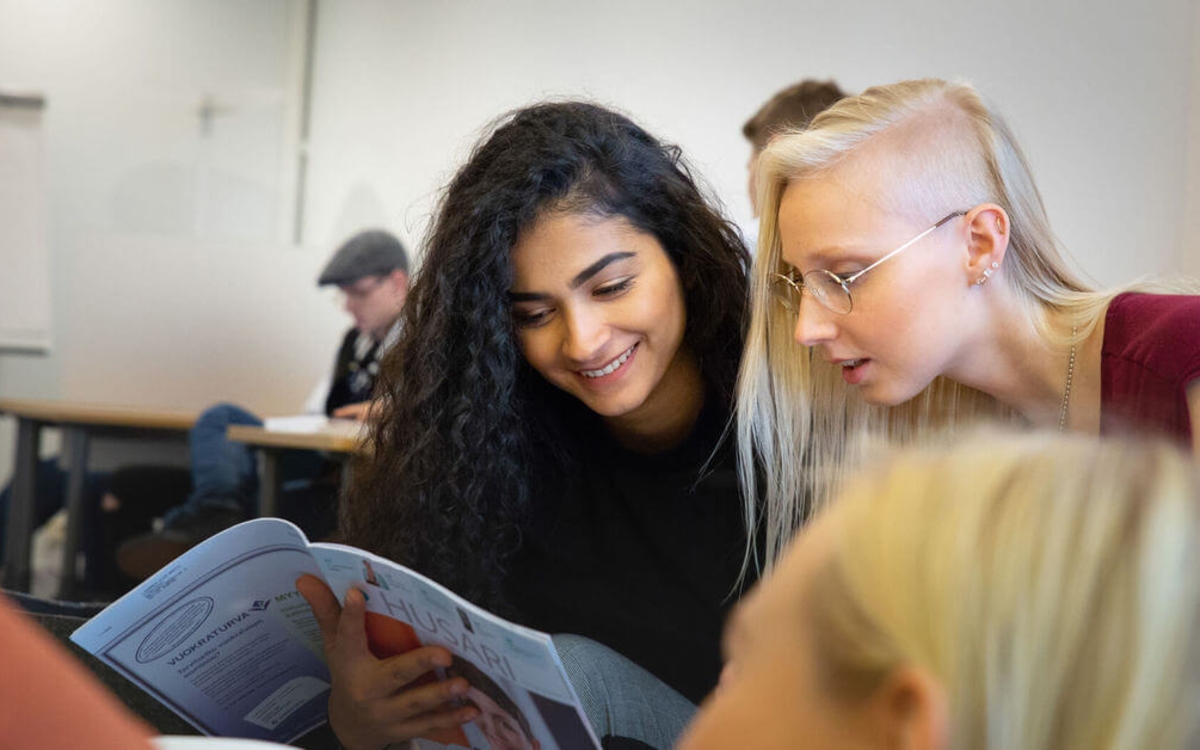What is the Circular Economy Living Lab?
On this page you will find information about the goals, networks, facilities and actors of the Living Lab.

Laurea Circular Economy Living Lab is a hub of education, RD and regional development associated with the circular economy. The Living Lab serves as a cooperation platform and a learning and development environment for students, teachers, staff, partners and international networks, both online and on the campus. The Living Lab also showcases Laurea's activities and results related to the circular economy.
Objectives
The objective of Laurea Circular Economy Living Lab is to combine education and R&D cooperation related to the circular economy and sustainable development with regional development. To achieve this goal, Laurea promotes students' knowledge and skills related to the circular economy and sustainable development by offering study units and learning contents related to these topics. Students are offered development and thesis projects in which they develop circular economy solutions together with Laurea's partner organisations. The Living Lab combines information and research with organisational development and serves as a networking hub for students and Laurea's partners.
Laurea promotes the entire personnel’s competence related to the circular economy and sustainable development by offering them opportunities for developing their competence and working together with other members of the Laurea community and partner organisations interested in these topics. The Living Lab serves as a link between different actors and collects relevant information and expertise in a single location for easy access.
Laurea promotes the circular economy activities of companies and organisations in Uusimaa by offering them an opportunity to develop their activities through various co-creation events, training, study unit and thesis projects as well as RDI projects. The Living Lab combines information and research with organisational development and facilitates networking between different actors.
Circular economy and sustainable development networks
Ellen MacArthur Foundation (EMF)
The EMF is the most important international network operator from the perspective of the circular economy, circular economy business and societal transformation. In practice, this foundation developed and launched the concept of circular economy in its current form and has contributed its views to both international policies and business settings. It brings together business operators and political actors, above all, but also research institutes and universities. The EMF additionally conducts research, organises networks and training, and highlights good examples. EMF website
Sustainable Development Solutions Network Northern Europe, (SDSN-NE)
The SDSN-NE is the Nordic network of a global network of universities and higher education institutions. The network engages in education and research cooperation in order to achieve the UN Sustainable Development Goals. The network advances the work on sustainable development in universities and higher education institutions from the perspective of education, research and organisations’ environmental programmes alike (properties, energy, water, waste, mobility, etc.). The members of the Nordic network comprise more than 60 universities and higher education institutions. SDSN-NE website
International Sustainable Campus Network (ISCN)
ISCN membership provides access to different resources related to education and sustainable development activities. The network shares good practices of sustainable development education and campus services between the members and organises joint events, conferences, etc. ISCN website
PIONEER Alliance for urban development
The purpose of the Alliance is to develop and carry out teaching, RDI activities and personnel exchanges that promote sustainable urban development in the international context. The Alliance strives to come up with new, creative solutions to the global challenges of urban development. The spearhead areas in teaching and research include carbon-neutral urban areas, sustainable tourism and housing, technological solutions for smart cities and strengthening resilience through safety and risk management. Co-development and close cooperation with cities, companies, organisations and citizens play a key part in achieving the Alliance's objectives. In addition to Laurea, the other members of the Alliance are Université Gustave Eiffel from France, ISCTE - University Institute of Lisbon from Portugal, TH Köln from Germany, the National Technological University of Athens from Greece and the University of Zilina from Slovakia. PIONEER Alliance website
Service design networks
Finnish Service Alliance
The Finnish Service Alliance promotes Finnish service research and finds new possibilities for applying it in companies and public organisations. It also promotes cooperation and exchanges of information between researchers and practical experts in its field and spreads awareness of the achievements of Finnish service research internationally. The Alliance contributes to the development of a service society and enhances the societal impact of service research. It organises various events, produces publications and disseminates information about its work as well as shares experience-based information and research evidence.
Service Design Network (SDN)
The SDN is an international network of service design professionals. Volunteers working for the organisation arrange various meetings and discussions annually. Laurea is a founding member of the Finnish SDN Chapter, which has almost 800 members or registered community observers. Through this network, Laurea offers students, personnel and alumni new and inspiring opportunities to develop their service design competence and to be part of a professional community that develops the field. Service Design Network website
European Network of Living Labs (ENoLL)
ENoLL is an international network of open ecosystems with more than 150 active living labs. ENoLL has studied and developed co-creation in open innovation ecosystems and assessed over 400 multi-actor open innovation and science ecosystems around the world. Laurea has taken part in developing living lab activities, and Director Tuija Hirvikoski from Laurea has served as the Chair of ENoLL since 2015. ENoLL website
More information:
- Markku Anttonen
- Markku.Anttonen@laurea.fi
- Tel 050409 8195
- Saara Gröhn
- Service Designer
- saara.grohn@laurea.fi
- Tel +358406684891
- Johanna Lunkka
- Senior Lecturer
- johanna.lunkka@laurea.fi
- Tel 358405329195
- Päivi Harmoinen
- Senior Lecturer
- Paivi.Harmoinen@laurea.fi
- Tel (09) 8868 7016
- Kati Tawast
- Senior Lecturer
- Kati.Tawast@laurea.fi
- Tel (09) 8868 7957